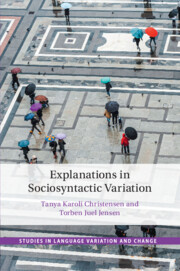4 results
19 - Constructions and Lectal Variation
- from Part V - Constructions in Sociocultural and Typological Variation
-
-
- Book:
- The Cambridge Handbook of Construction Grammar
- Published online:
- 30 January 2025
- Print publication:
- 06 February 2025, pp 497-518
-
- Chapter
- Export citation
6 - From Social Psychology to Cognitive Sociolinguistics
-
-
- Book:
- Word Grammar, Cognition and Dependency
- Published online:
- 19 December 2024
- Print publication:
- 02 January 2025, pp 144-162
-
- Chapter
- Export citation
6 - Constructional Variation and Change
-
- Book:
- Construction Grammar
- Published online:
- 20 September 2023
- Print publication:
- 28 July 2022, pp 236-255
-
- Chapter
- Export citation

Explanations in Sociosyntactic Variation
-
- Published online:
- 06 January 2022
- Print publication:
- 20 January 2022

